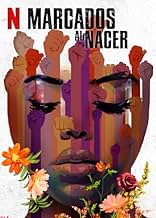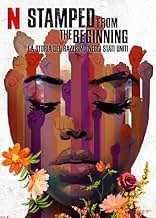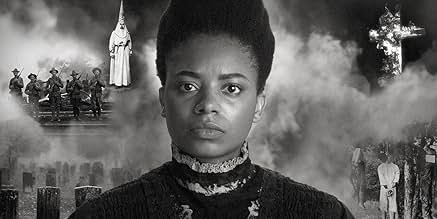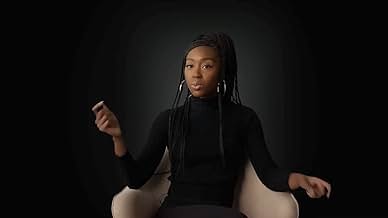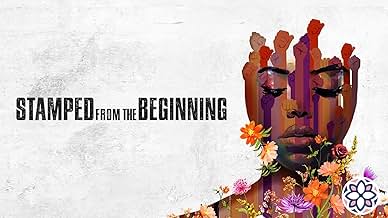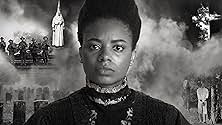IMDb रेटिंग
6.7/10
1.4 हज़ार
आपकी रेटिंग
अपनी भाषा में प्लॉट जोड़ेंA hybrid documentary/scripted feature based on Dr. Kendi's National Book Award-winning "Stamped from the Beginning: The Definitive History of Racist Ideas".A hybrid documentary/scripted feature based on Dr. Kendi's National Book Award-winning "Stamped from the Beginning: The Definitive History of Racist Ideas".A hybrid documentary/scripted feature based on Dr. Kendi's National Book Award-winning "Stamped from the Beginning: The Definitive History of Racist Ideas".
- 1 प्राइमटाइम एमी के लिए नामांकित
- 2 जीत और कुल 10 नामांकन
फ़ीचर्ड समीक्षाएं
This review is by someone who is not an American, but has lived in the US for 8 years during her PhD and Post-doctoral education. She is not black. I see reviews here that sometimes has nothing to do with the material, but has much to do with a person's political views. I wished to put who I am out there to say that this review is not the product of my political stance or belongingness. Here it goes:
I liked this documentary, and will rewatch it. The other reviews talk about horrible editing. It did not bother me. Sometimes, living in the moment, we don't realize that historical narratives are continuously being rewritten, and edited. It is painful to revisit a past, where there is so much pain. But it should be revisited so that we understand the root of current problems and why they are so persistent, complex and challenging. We inherit great things from our ancestor and also some things we may not be too proud of. That is OK, as long as we strive to be a better version of ourselves. This is what the documentary left me with. I enjoyed it immensely. Oh! Also I now have the urge to read more of Maya Angelou.
Imagine what you'd do, in a world that's against you, where the prejudice and hate, controls your life and dominates, where the boundaries are so narrow, for you to plough your freedom farrow, and the clichés mould and form, to show you're nothing like their norm. Imagine what you'd do, controlled by those without a clue, as untruths are formed and conjured, by the government incumbent, who's intent to lend a hand, is cloaked with aims to keep command, as the message keeps repeating, cascades through generations reaping. Imagine what you'd do...
A powerful and thought provoking piece of documentary filmmaking.
A powerful and thought provoking piece of documentary filmmaking.
I quite like Kendi's book, and when I saw this pop up on Netflix I clicked it instantly, looking forward to see a documentary visualize the content of the book in an engaging manner.
Sadly, it's honestly harder to follow than expected, even for someone who has read the book. Williams' direction led to extreme over-editing, and the lack of captions or context for what you are looking at in the montages leads to frequent confusion and annoyance.
To be clear, I understand the logic behind Williams' editing style--but it still doesn't work. What he was going for was to try to amplify the continuities of 17th century racism to racism today, which is fitting with Kendi's main thesis. But in terms of documentary style, it goes a little 'too extra' even to that end, mixing together speeches, films, historical footage, contemporary news footage, highly stylized reenactments... to the extent that at any given montage, you could go a solid three minutes not being sure what CENTURY the footage you're looking at is coming from, let alone decade, or whether it was real footage or fiction.
If you were an educator, and wanted to have a conversation about Kendi's ideas, but hadn't assigned the full book, should you show this to your class instead? No, absolutely not -- this documentary will be annoying and confusing if you aren't already familiar with Kendi's point, and honestly, even if you agree with Kendi's thesis you might even then find much to dislike.
For instance, consider the 7 minute sequence from about 11 minutes into the documentary to the 18 minute mark, on Bacon's rebellion. Could your students answer the following questions: -What century was Bacon's rebellion in?
-What was Bacon's rebellion about?
-What was the outcome of Bacon's rebellion?
No--because Bacon's rebellion is just an incident mentioned in support of the idea that whiteness was invented to prevent poor whites from allying with poor blacks. You might be able to follow the point the documentary is trying to make, but the result is that, unless you already know the example, you would completely lose sense of historical trajectory or continuity because the documentary tells you so little contextualized information.
Now you might say--oh they didn't have time to go into all this context on the example. But they used two minutes right after introducing Bacon's Rebellion to give a four-century spanning montage of depictions of racism... instead of giving almost any basic context about the example of Bacon's rebellion or its relevance to the argument.
A lot of the montages, for that matter, feel... conspiratorial? What I mean by this is that again, they're not really making articulated connections; they're not even naming the people in the photos, so either you 'get it' or you don't--but isn't the point of a documentary to make it so that people unfamiliar with the subject will understand? There's no names given when someone's face pops up on screen, and the faces and names go by so fast even someone highly educated is likely to be left wondering "wait who was that guy..?"
Basically, even in a classroom setting where you had already read Kendi's book... I honestly feel like this documentary would do more harm to comprehension than good.
Sadly, it's honestly harder to follow than expected, even for someone who has read the book. Williams' direction led to extreme over-editing, and the lack of captions or context for what you are looking at in the montages leads to frequent confusion and annoyance.
To be clear, I understand the logic behind Williams' editing style--but it still doesn't work. What he was going for was to try to amplify the continuities of 17th century racism to racism today, which is fitting with Kendi's main thesis. But in terms of documentary style, it goes a little 'too extra' even to that end, mixing together speeches, films, historical footage, contemporary news footage, highly stylized reenactments... to the extent that at any given montage, you could go a solid three minutes not being sure what CENTURY the footage you're looking at is coming from, let alone decade, or whether it was real footage or fiction.
If you were an educator, and wanted to have a conversation about Kendi's ideas, but hadn't assigned the full book, should you show this to your class instead? No, absolutely not -- this documentary will be annoying and confusing if you aren't already familiar with Kendi's point, and honestly, even if you agree with Kendi's thesis you might even then find much to dislike.
For instance, consider the 7 minute sequence from about 11 minutes into the documentary to the 18 minute mark, on Bacon's rebellion. Could your students answer the following questions: -What century was Bacon's rebellion in?
-What was Bacon's rebellion about?
-What was the outcome of Bacon's rebellion?
No--because Bacon's rebellion is just an incident mentioned in support of the idea that whiteness was invented to prevent poor whites from allying with poor blacks. You might be able to follow the point the documentary is trying to make, but the result is that, unless you already know the example, you would completely lose sense of historical trajectory or continuity because the documentary tells you so little contextualized information.
Now you might say--oh they didn't have time to go into all this context on the example. But they used two minutes right after introducing Bacon's Rebellion to give a four-century spanning montage of depictions of racism... instead of giving almost any basic context about the example of Bacon's rebellion or its relevance to the argument.
A lot of the montages, for that matter, feel... conspiratorial? What I mean by this is that again, they're not really making articulated connections; they're not even naming the people in the photos, so either you 'get it' or you don't--but isn't the point of a documentary to make it so that people unfamiliar with the subject will understand? There's no names given when someone's face pops up on screen, and the faces and names go by so fast even someone highly educated is likely to be left wondering "wait who was that guy..?"
Basically, even in a classroom setting where you had already read Kendi's book... I honestly feel like this documentary would do more harm to comprehension than good.
This was one of the most creative and informative documentaries about racism in our country. The various clips and illustrations and music made the film engaging. The narrators were incredible in their presentation and accuracy. The author of the book that was the basis for this film delved into the history behind the history. It shows that racism is a false construct and needs to be confronted on a daily basis. I am recommending this to my children and my friends. My hope is that this will help change people's attitudes and help us all realize that prejudice is still very present in our country and culture. These very learned scholars and presenters enlightened my awareness and I am deeply grateful they made this documentary.
I rarely if ever post on this platform, but this one really went on my nerves. The perception provided in this documentary is great. The information you get is educational and at times mind blowing (especially for those ill-informed of USA history).
However, the production, editing, scene cutting, jumping from animation to another and then leaving viewers longing with the animated scenery mixed with some modern songs that just do not sit right is something that diminished the very purpose of this ever so important narrative. It is almost impossible to endure such editorial horror without some skips. I think it requires more formal and serious approach corresponding to the knowledge of acting narrators and topic itself.
However, the production, editing, scene cutting, jumping from animation to another and then leaving viewers longing with the animated scenery mixed with some modern songs that just do not sit right is something that diminished the very purpose of this ever so important narrative. It is almost impossible to endure such editorial horror without some skips. I think it requires more formal and serious approach corresponding to the knowledge of acting narrators and topic itself.
टॉप पसंद
रेटिंग देने के लिए साइन-इन करें और वैयक्तिकृत सुझावों के लिए वॉचलिस्ट करें
- How long is Stamped from the Beginning?Alexa द्वारा संचालित
विवरण
- रिलीज़ की तारीख़
- कंट्री ऑफ़ ओरिजिन
- आधिकारिक साइट
- भाषा
- इस रूप में भी जाना जाता है
- Damgalılar: Amerika'da Irkçılığın Tarihi
- फ़िल्माने की जगहें
- उत्पादन कंपनियां
- IMDbPro पर और कंपनी क्रेडिट देखें
- चलने की अवधि1 घंटा 31 मिनट
- रंग
- ध्वनि मिश्रण
इस पेज में योगदान दें
किसी बदलाव का सुझाव दें या अनुपलब्ध कॉन्टेंट जोड़ें



